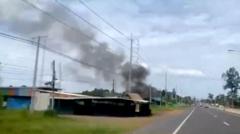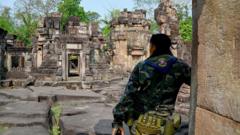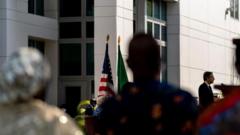Recent military clashes have erupted following deteriorating relations between the two nations, fueled by a leaked phone conversation involving key political figures.
Fraying Ties: The Escalation of Violence at the Thailand-Cambodia Border

Fraying Ties: The Escalation of Violence at the Thailand-Cambodia Border
A deep-seated political rift ignites conflict between Thailand and Cambodia, resulting in casualties and heightened tensions along their disputed border.
The ongoing conflict at the Thailand-Cambodia border has erupted into violence, leaving 12 civilians dead, according to Thai authorities. This latest outbreak of hostilities comes in the wake of rising tensions that were exacerbated last month when Cambodia’s Prime Minister Hun Sen leaked a phone conversation with Thailand's Prime Minister Paetongtarn Shinawatra, leading to public anger and Paetongtarn's suspension from office.
Historically, the border between Thailand and Cambodia has been a source of friction, resulting in deadly clashes in the past. Both nations have shared a tumultuous relationship, marked by periods of conflict alongside attempts at reconciliation. This latest skirmish began after five Thai soldiers were injured by a landmine, prompting a swift military reprisal.
The backdrop to this escalation reveals a personal betrayal; Hun Sen’s decision to disclose the private conversation seems to have shattered a friendship between the two political families that spans decades. In this conversation, Paetongtarn criticized her own military commanders and addressed Hun Sen as "uncle," a previously trusted rapport that now appears irreparably damaged. Since the leak, she has faced severe political repercussions, with her future in government uncertain.
Calls for de-escalation have previously been made, as both nations sought to avoid armed conflict following an earlier incident in May that resulted in one casualty. Yet the situation transformed significantly after the leaked conversation ignited fierce reactions on both sides, leading to aggressive rhetoric and investigations into Cambodian business figures tied to controversial gambling operations.
In this volatile environment, neither side appears inclined to retreat. As their respective governments grapple with economic challenges and seek to maintain a facade of strength, the potential for further clashes remains high. The involvement of regional organizations such as ASEAN, tasked with promoting peace among Southeast Asian countries, could prove integral in mitigating tensions, although significant diplomatic efforts will be required to resolve the underlying disputes.
With the political landscape shifting rapidly in both countries, questions linger as to Hun Sen’s motivations in escalating this conflict. Whether driven by personal vendettas or political strategy, it is clear that the rift between Thailand and Cambodia could have far-reaching consequences if left unchecked.
Historically, the border between Thailand and Cambodia has been a source of friction, resulting in deadly clashes in the past. Both nations have shared a tumultuous relationship, marked by periods of conflict alongside attempts at reconciliation. This latest skirmish began after five Thai soldiers were injured by a landmine, prompting a swift military reprisal.
The backdrop to this escalation reveals a personal betrayal; Hun Sen’s decision to disclose the private conversation seems to have shattered a friendship between the two political families that spans decades. In this conversation, Paetongtarn criticized her own military commanders and addressed Hun Sen as "uncle," a previously trusted rapport that now appears irreparably damaged. Since the leak, she has faced severe political repercussions, with her future in government uncertain.
Calls for de-escalation have previously been made, as both nations sought to avoid armed conflict following an earlier incident in May that resulted in one casualty. Yet the situation transformed significantly after the leaked conversation ignited fierce reactions on both sides, leading to aggressive rhetoric and investigations into Cambodian business figures tied to controversial gambling operations.
In this volatile environment, neither side appears inclined to retreat. As their respective governments grapple with economic challenges and seek to maintain a facade of strength, the potential for further clashes remains high. The involvement of regional organizations such as ASEAN, tasked with promoting peace among Southeast Asian countries, could prove integral in mitigating tensions, although significant diplomatic efforts will be required to resolve the underlying disputes.
With the political landscape shifting rapidly in both countries, questions linger as to Hun Sen’s motivations in escalating this conflict. Whether driven by personal vendettas or political strategy, it is clear that the rift between Thailand and Cambodia could have far-reaching consequences if left unchecked.




















